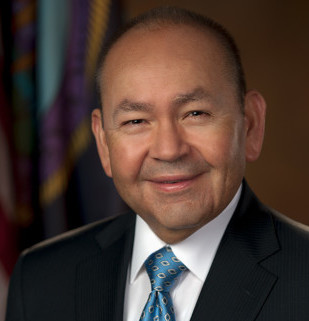By Jason Doyle Oden
After five years of mediation, the Chickasaw and Choctaw Nations, the State of Oklahoma and the City of Oklahoma City have come to an agreement over the water rights surrounding Sardis Lake. The agreement will need Congressional approval, but once it is finalized it will settle the long-standing questions concerning water rights ownership and regulatory authority over the waters of the Choctaw and Chickasaw Nations’ historic treaty territories.
The framework addresses areas of how the water resources are used within the Settlement Area, approximately 22 counties in south-central and southeastern Oklahoma. It protects existing water rights, affirms the State has the authority over water rights permitting and administration, and sets standards which must be met by Oklahoma City for it to draw water from Sardis Lake. It also protects recreation, fish and wildlife uses.
“We are proud to be part of this historic agreement among the State of Oklahoma, the Choctaw and Chickasaw Nations and the City of Oklahoma City,” said Oklahoma Gov. Mary Fallin. “We all understand the importance of water for sustaining life and as the engine that drives our economic growth. By choosing cooperation and collaboration over conflict and litigation, this agreement strengthens governmental relationships based on the common interests of the State and the Choctaw and Chickasaw Nations.”
 Fallin notes the agreement encourages cooperation between the State and the Choctaw and Chickasaw Nations.
Fallin notes the agreement encourages cooperation between the State and the Choctaw and Chickasaw Nations.
“While the State will continue to exercise its authority to manage and protect water resources throughout Oklahoma, the Choctaw and Chickasaw Nations will rightly play a role in significant water allocation and management evaluations within the Settlement Area. This agreement is an important first step in all Oklahomans coming together to address the wise use and protection of our shared water resources.”
If Congress approves, the several lawsuits filed over water rights in the Settlement Area will be dropped. Attorney General Scott Pruitt welcomes to compromise.
 “Water is a shared resource, so finding a way to work together was vitally important. I commend the Choctaw and Chickasaw Nations and City of Oklahoma City for working purposefully and tirelessly with the State over the past five years to reach an equitable agreement. The State retains its permitting authority over water in the Settlement Area, which is important since uniform permitting and administration provide certainty and consistency for the management and use of water resources. When finalized, the agreement will protect existing rights and provide certainty for future uses in southeastern Oklahoma and other areas of the state,” said Pruitt.
“Water is a shared resource, so finding a way to work together was vitally important. I commend the Choctaw and Chickasaw Nations and City of Oklahoma City for working purposefully and tirelessly with the State over the past five years to reach an equitable agreement. The State retains its permitting authority over water in the Settlement Area, which is important since uniform permitting and administration provide certainty and consistency for the management and use of water resources. When finalized, the agreement will protect existing rights and provide certainty for future uses in southeastern Oklahoma and other areas of the state,” said Pruitt.
Under the agreement, the tribes will be part of the technical evaluation of significant future water right allocation proposals.
 “This agreement is a win for all Oklahomans,” said Gov. Bill Anoatubby of the Chickasaw Nation. “We have forged this deal based on our common interests with an understanding that we all want the same thing – to take care of our vital water resources responsibly with respect to the needs of all Chickasaws, Choctaws and Oklahomans. The Nations now have a meaningful and active voice in significant water transfers from our area. Furthermore, this settlement preserves and protects water resources essential to economic growth and quality of life in south-central and southeastern Oklahoma. Unity and cooperation among all stakeholders offers our best chance to help ensure a strong economy and thriving natural environment for our children and grandchildren through proper stewardship of our shared water resources.”
“This agreement is a win for all Oklahomans,” said Gov. Bill Anoatubby of the Chickasaw Nation. “We have forged this deal based on our common interests with an understanding that we all want the same thing – to take care of our vital water resources responsibly with respect to the needs of all Chickasaws, Choctaws and Oklahomans. The Nations now have a meaningful and active voice in significant water transfers from our area. Furthermore, this settlement preserves and protects water resources essential to economic growth and quality of life in south-central and southeastern Oklahoma. Unity and cooperation among all stakeholders offers our best chance to help ensure a strong economy and thriving natural environment for our children and grandchildren through proper stewardship of our shared water resources.”
Choctaw Nation Chief Gary Batton believes the protections put into place by the agreement are necessary to promote conservation of the area.
 “What happens in regards to the protection and preservation of water is of great importance. When finalized, this agreement secures existing uses of water and provides certainty with regard to the future use of Sardis Lake for the benefit of recreation, fish and wildlife, and local water use. Importantly, moving forward, both the Choctaw and Chickasaw Nations will have a seat at the table in the protection of southeastern Oklahoma water resources for municipal and recreational use. And, as we all know, a vibrant recreation and tourism industry creates jobs and strengthens economies inside and outside of the Settlement Area. Additionally, we are pleased that the agreement supports keeping water in the Settlement Area within the State by maintaining current state law prohibitions and adding significant protections,” said Batton.
“What happens in regards to the protection and preservation of water is of great importance. When finalized, this agreement secures existing uses of water and provides certainty with regard to the future use of Sardis Lake for the benefit of recreation, fish and wildlife, and local water use. Importantly, moving forward, both the Choctaw and Chickasaw Nations will have a seat at the table in the protection of southeastern Oklahoma water resources for municipal and recreational use. And, as we all know, a vibrant recreation and tourism industry creates jobs and strengthens economies inside and outside of the Settlement Area. Additionally, we are pleased that the agreement supports keeping water in the Settlement Area within the State by maintaining current state law prohibitions and adding significant protections,” said Batton.
Oklahoma City will be able to get water from Sardis Lake and the Kiamichi River. The releases will be governed by a system of lake level release restrictions based on the Oklahoma Department of Wildlife Conservation’s management plan. The move is intended to protect the environment and recreational uses.
Oklahoma City Mayor Mick Cornett said access to water will be necessary as the capitol city continues to grow.
 “We expect the considerable growth we have experienced in Oklahoma City over the past decades to continue well into this century. Our future growth will be propelled by our ability to attract capital, promote innovation, maintain affordable energy, increase productivity, and probably most importantly, manage our water and land use. And while this agreement ensures we have access to water through a clearly defined and orderly process for decades ahead, we must continue to promote water conservation. We are pleased to be part of this agreement and the opportunities it creates for even greater collaboration and cooperation in the future,” said Cornett.
“We expect the considerable growth we have experienced in Oklahoma City over the past decades to continue well into this century. Our future growth will be propelled by our ability to attract capital, promote innovation, maintain affordable energy, increase productivity, and probably most importantly, manage our water and land use. And while this agreement ensures we have access to water through a clearly defined and orderly process for decades ahead, we must continue to promote water conservation. We are pleased to be part of this agreement and the opportunities it creates for even greater collaboration and cooperation in the future,” said Cornett.
The Oklahoma Water Resources Board will oversee the system of water allocation and administration. It also forgives the outstanding debt associated with Sardis Lake.


